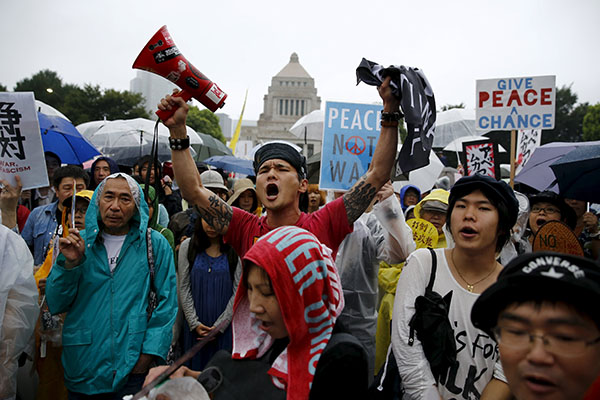Abe's talk of proactive peace fails to convince
Updated: 2015-09-14 08:44
By Cai Hong(China Daily)
|
||||||||
 |
|
People hold placards and shout slogans as they protest against Japan's Prime Minister Shinzo Abe's security bill outside the parliament in Tokyo August 30, 2015. [Photo/Agencies] |
As people looked for such words as "aggression", "apology", "remorse" and "colonial rule" in Japanese Prime Minister Shinzo Abe's Aug 14 statement, Michio Hamaji was more concerned about how it ended.
The Japanese businessman-turned activist said the "proactive contribution to peace" Abe spoke of when concluding his speech is worrying as it shows where the prime minister intends to move his country to in the future.
It is a phrase Abe has been seeking to sell abroad since he took office for the second time in 2012.
Speaking at the Hudson Institute in Washington D.C. in September 2013, Abe told his American audience that Japan is resolved to be a "proactive contributor to peace". He reiterated this when speaking to the US Congress in April.
Hamaji is worried as he sees Abe's "proactive contribution to peace" as the collective self-defense the Japanese prime minister wants his country to exercise.
Hamaji criticized Abe for borrowing and perverting the idea of "positive peace" from Johan Galtung, the Norwegian sociologist and father of peace studies.
Galtung distinguishes between two types of peace: Negative peace, which is simply the condition under which there is an absence of violence, including war; and positive peace, which, while requiring the absence of direct violence, involves identifying and preventing the root causes of violence in order to end violence and the unjust policies or practices that fuel it.
It is the "integration of human society," according to Galtung.
- US must rein in revisionist Abe government
- Self-deceiving Abe will tarnish Japan's image
- Abe re-elected head of party as vote on 'militaristic' bill nears
- Reaction to Ban's visit sets Abe on wrong side of history
- Abe's avoidance of ceremonies shows he seeks no reconciliation
- Abe's avoidance of ceremonies shows he seeks no reconciliation
- Global health entering new era: WHO chief
- Brazil's planning minister steps aside after recordings revelation
- Vietnam, US adopt joint statement on advancing comprehensive partnership
- European border closures 'inhumane': UN refugee agency
- Japan's foreign minister calls A-bombings extremely regrettable
- Fukushima impact unprecedented for oceans: US expert

 Stars of Lijiang River: Elderly brothers with white beards
Stars of Lijiang River: Elderly brothers with white beards
 Wealthy Chinese children paying money to learn British manners
Wealthy Chinese children paying money to learn British manners
 Military-style wedding: Fighter jets, grooms in dashing uniforms
Military-style wedding: Fighter jets, grooms in dashing uniforms
 Striking photos around the world: May 16 - May 22
Striking photos around the world: May 16 - May 22
 Robots help elderly in nursing home in east China
Robots help elderly in nursing home in east China
 Hanging in the air: Chongqing holds rescue drill
Hanging in the air: Chongqing holds rescue drill
 2.1-ton tofu finishes in two hours in central China
2.1-ton tofu finishes in two hours in central China
 Six things you may not know about Grain Buds
Six things you may not know about Grain Buds
Most Viewed
Editor's Picks

|

|

|

|

|

|
Today's Top News
Liang avoids jail in shooting death
China's finance minister addresses ratings downgrade
Duke alumni visit Chinese Embassy
Marriott unlikely to top Anbang offer for Starwood: Observers
Chinese biopharma debuts on Nasdaq
What ends Jeb Bush's White House hopes
Investigation for Nicolas's campaign
Will US-ASEAN meeting be good for region?
US Weekly

|

|








